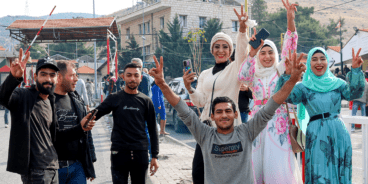
Atrocity Alert No. 91: Syria and Myanmar (Burma)
Atrocity Alert is a weekly publication by the Global Centre for the Responsibility to Protect highlighting situations where populations are at risk of, or are enduring, mass atrocity crimes.
Syrian government intensifies airstrikes and chemical weapons attacks on civilians
As the civil war in Syria approaches its seventh anniversary, civilians across the country continue to face mass atrocities, including the use of chemical weapons. Despite the designation of the opposition-held areas of Idlib and eastern Ghouta as “de-escalation zones” following a May 2017 agreement between the governments of Syria, Russia, Iran and Turkey, both areas have experienced relentless airstrikes throughout the last week.
The Syrian government launched a military offensive in December 2017 to retake territory within Idlib governorate. Following the shooting down of a Russian jet on Saturday, 3 February, airstrikes by the Syrian and Russian air forces increased dramatically across Idlib, damaging three hospitals and killing at least 20 people. Fighting has also intensified in eastern Ghouta, where approximately 400,000 people remain besieged by Syrian government forces. Airstrikes killed at least 80 civilians across the enclave yesterday, 6 February. More than 130 civilians have been killed in eastern Ghouta since Monday.
In addition, Syrian government forces have continued to use chemical weapons, with at least five alleged chlorine gas attacks taking place since 13 January. According to reports, chlorine was used in Douma, eastern Ghouta, on 13 January, 22 January and 1 February. On Monday, 5 February, it was reported that two further chlorine gas attacks took place in the towns of Irbin in eastern Ghouta and Saraqeb in Idlib governorate. According to humanitarian volunteers from the Syrian Civil Defense, at least nine people were treated for symptoms of chlorine exposure following the Saraqeb attack.
The use of chemical weapons, including asphyxiating chlorine gas, is strictly prohibited under international law and constitutes a war crime. Despite being banned for over a century and further outlawed via the 1997 Chemical Weapons Convention, the UN Security Council has repeatedly failed to hold perpetrators of alleged chemical weapons attacks in Syria accountable. Because of two Russian vetoes last November, the Council failed to renew the mandate of the Organization for the Prohibition of Chemical Weapons-Joint Investigative Mechanism, established to investigate and attribute responsibility for chemical weapons attacks in Syria.
The gradual normalization of chemical warfare not only poses a growing threat to all Syrians, but to all members of the international community. The UN Security Council must find a means of bridging their partisan divisions and holding all those responsible for using chemical weapons accountable, including via the UN’s International, Impartial and Independent Mechanism to assist in the investigation and prosecution of perpetrators of atrocities in Syria.
Mass graves and mounting evidence of genocide in Myanmar (Burma)
On 1 February the Associated Press reported on the existence of at least five mass graves in the village of Gu Dar Pyin in northern Rakhine State, Myanmar. The faces of many of those hastily buried in the graves were burned with acid, indicating a deliberate attempt to conceal the identity of victims. Eyewitness testimony and satellite evidence suggest that there could be several more mass graves in the area.
The government of Myanmar has publicly denied these findings, claiming instead that 19 “terrorists” had been killed by security forces and “carefully buried” in the village. The government continues to block access to northern Rakhine State for media, human rights monitors and independent investigators.
The discovery of the mass graves is the latest evidence of a possible genocide that has been committed against the Rohingya population in Myanmar. Since 25 August last year the Rohingya have endured widespread and systematic attacks by government security forces, including mass killings, rape, torture, and forced displacement. More than 350 Rohingya villages have been burned down. These acts appear to have been committed with intent to destroy the Rohingya as a group. More than 688,000 Rohingya have fled to Bangladesh as a result, with more than 800 people still reportedly crossing the border over the last week.
Authorities in Myanmar have not only failed to hold those responsible for these atrocities accountable, they continue to deny that any crimes have taken place in Gu Dar Pyin or anywhere else.
Despite mounting evidence of genocide, the UN Security Council has still not adopted a single resolution on Myanmar. The Security Council should take urgent action, including imposing an arms embargo. The Council should also impose targeted sanctions on those members of the security forces responsible for atrocities, including Commander in Chief Min Aung Hlaing and senior commanders overseeing so-called “clearance operations” in Rakhine State. A resolution should also demand immediate access for UN representatives and independent investigators to Rakhine State, including the Special Rapporteur on the situation of human rights in Myanmar and members of the fact-finding mission mandated by the Human Rights Council. The threat of a veto by a permanent member of the Security Council should not prevent Council members from upholding their responsibility to protect the Rohingya.
In the absence of UN Security Council action, all UN member states should take immediate bilateral action regarding mass atrocities committed in Myanmar, including imposing targeted sanctions against those responsible, suspending all military training programs, and reviewing all aid and development programs in Rakhine State.


Atrocity Alert No. 421: Syria, Haiti and Genocide Remembrance and Prevention
